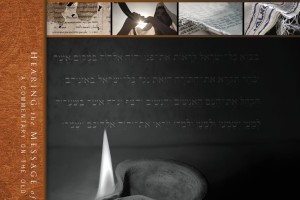Over the past couple weeks I have attempted to lay a framework for the one-kingdom v. two-kingdom debate. I have done this by providing a brief sketch of crucial post reformation thinkers on the issue such as Abraham Kuyper and the later neo-Calvinists. Here we saw that while Kuyper was nowhere near an outright departure from earlier Reformed thinking, he did start to make some subtle changes to the two-kingdom framework that would later become more amplified in the likes of Herman Dooeyweerd. Dooeyweerd’s influence was far reaching as his ideas are reflected in the works of a number of other contemporary theologians such as Michael Goheen. After this brief survey in the first week, I attempted to show that the two-kingdoms framework was intended from the beginning. The scriptures show that the Noahic covenant was a covenant of commonality intended for all of humanity and the Abrahamic covenant was one of particularity for God’s chosen people.
We have now reached a very major issue in the discussion and it is that of the Mosaic covenant. What are we to make of this time in redemptive history when there is a setting aside of a two-kingdom framework? This question is essential because out of it will flower the appropriate hermeneutic for understanding what, if any, value the OT texts on theocratic Israel provide for modern political discourse. I want to suggest here that the one-kingdom framework that is at work in Israel has been entirely abrogated at this point in salvation history and thus, the modus operandi for Israel can offer very little useful guidance for modern political states.
To the extent that it does provide any sort of useful guidance, it is only the extent to which certain activities in Israel coincide with “the nature of things.” That is, natural law. But it is important to remark here that coincidence with the nature of things is not something that is exclusively restricted to the Old Testament Israelite theocracy. Any people group in all of history that roots its laws in the nature of things provides just as valuable practical insight as the OT scriptures do on modern political theory. Thus I do leave the door open for using the OT scriptures in civil discourse but only to provide anecdotal connection to natural law principles. It is not to be used as a source of authoritative appeal in the civil kingdom. Indeed, I am suggesting that natural law is a stand-alone source of revelation that can be accessed by pagan nations in order to establish civil societies that are built on equity and justice. I will further argue in a coming post on natural law that it was intended to function as the normative seat for the creation of civil law.
I have now introduced another crucial theme to the entire two kingdoms discussion, the theme of natural law. For those new to the debate, it is almost impossible to have the two-kingdom’s discussion without weaving in the issue of natural law. The two topics go hand in hand and while I have attempted to keep them separate for clarity, I wanted to mention it here briefly in order to ease into the convergence of these major theological principles. But before we get there, let us continue to survey the Old Testament in regards to two-kingdom thought.
Last week we left off our OT narrative with Abraham in Genesis 17. Going forward, we can see that the two-kingdoms method of living continues to last throughout the patriarchal period. We see this in that Abraham and the other patriarchs retain their religious partirities even though they continue to live amongst pagan people in a sphere of life marked out by commonality. A prominent example of this concept is found in Abraham’s signing a treaty with the pagan Abimelech (Gen. 21:22-24). He still interacts with those who are non-believers and even makes pacts with them so long as those pacts do not threaten his religious uniqueness. The interaction between Abraham and Abimelech is intriguing here (circling back to natural law) as Abimelech states, “God is with you in all that you do. Now therefore swear to me here by God that you will not deal falsely with me or with my descendants or my posterity but as I have dealt kindly with you, so you will deal with me and with the land where you have sojourned.” Note here that Abimelech makes appeals to Abraham based on a general sense of kindness and honesty even though he is not one of God’s chosen people. The treaty is not constructed on religious particularities for if it was, it is highly doubtful that the men could have come to any substantive agreement on a treaty! Another example from Genesis is found in Genesis 23 when Abraham enters into a private market transaction with Ephron. Here again, Abraham interacts with the Hittite Ephron based on a shared humanity, not a shared religious conviction. This two-kingdom principle continued to manifest itself throughout the patriarchal period (Genesis 41:37-57; 47:1-6).
After this Patriarchal period, redemptive history experiences an abrupt change in the creation of theocratic Israel. David VanDrunen sums up the change well in his monograph A Biblical Case for Natural Law by stating:
While the patriarchs, under the Abrahamic covenant, were separated from the world in regard to their religious life and redemptive hope but mingled with the world in regard to their social and cultural life, the Mosaic covenant separated God’s people from the world in the social and cultural realm as well. Instead of living as aliens in the lands of others, now God’s people were given a land of their own.
Indeed this situation was unique. But there is good reason for believing that this situation was not intended to be either normative or lasting. A couple of considerations lead us to this conclusion. We know from the apostle Paul and the overall covenantal structure of scripture that God has always had one people, not two. True Jews are those who have trusted in Christ for salvation and been circumcised in the heart (Romans 2:28-29; Galatians 3:29). Those who belong to Christ are the true heirs of the Abrahamic covenant. The reason I point this out is because it provides a context for what I call “typological narrowing” in the two-kingdom framework. Whereas God’s people are identified with national Israel in the old covenant, there has been a narrowing in the new covenant to the church. The church is the true possessor of the Abrahamic promises. This is important for the present discussion because it means that any of the theocratic concepts given to Israel now have to find their comparable representation in the church, not a geo-political entity.[1] Since the church is a more true representation of God’s people, it only makes sense that the OT texts be related to God’s covenant people now, not pagan nations. This typological narrowing continues to intensify with the passage of salvation history and will ultimately culminate at Christ’s coming when all wickedness and unbelief is purged (Revelation 21:22-27).
Second, the terms and practices of the Mosaic covenant were given explicitly to a theocracy with conditional promises that apply only to that nation, at that particular time. To attempt to use the OT as some sort of standard for modern social theory is to completely miss the point that those conditional promises were made to God’s people, not to pagan nations.
So why are so many evangelicals willing to appeal to the scriptures (OT&NT) to construct civil society? I think part of the answer, at least for a bulk of evangelicalism, is that there is an overriding dogmatism about America being a special nation that God looks upon with favor, much like he did the Israelites. Call it the stained conscience of dispensational America. Yet, I would be first to state that I don’t think it impossible for God to look upon a certain nation with favor and another nation with disfavor. But the reason that he would do this is because of their adherence or lack thereof when it comes to following natural law, the normative standard for civil government. When most Christians discuss God’s favor as it pertains to modern America, they mean that God looks upon us with favor or disfavor based on how “Christian” America is. They believe God’s favor is bound up in following the bible as a nation, thus collapsing the civil kingdom and religious kingdom onto one another. When God’s favor is equated with a nation following the bible, a one-kingdom framework is the inevitable outworking of this error. And because of this, it is only natural to use the bible in civil discourse. It is a self-reinforcing theological grid.
At this point some of my readers may think that my criticisms are either overblown or that my ideas are somewhat provocative and radical. But history shows the path that I am taking is not lacking in the Reformed tradition. It was Calvin himself who argued (Institiutes, 2.2.13):
…we have one kind of intelligence of earthly things, and another of heavenly things. By earthly things, I mean those which relate not to the God and his kingdom, to true righteousness and future blessedness, but have some connection with the present life, and are in a manner confined within its boundaries. By heavenly things, I mean the pure knowledge of God, the method of true righteousness, and the mysteries of the heavenly kingdom. To the former belong matters of policy and economy, all mechanical arts and liberal studies.
This comment from Calvin is fascinating because he deliberately delinks policy, economy, mechanical arts and liberal studies from the kingdom of God and ties them explicitly to his category of “earthly things.” While there is much debate about Calvin on the topics of natural law and the two kingdoms due to his practical inconsistencies, a two-kingdom framework seems to be present in his writing. And this is also why Calvin refused to acknowledge OT texts as an acceptable means of constructing civil society.
I could write much more about this topic but this post is already too long. In this post I have introduced a number of additional concepts that tie into the two-kingdom framework. Indeed two-kingdom’s theology does not stand alone. Rather it stands in concert with the rest of one’s theological system. It is my aim in the coming weeks to draw in the idea of natural law and defend it as being the right standard for the civil kingdom. Additionally, I plan to post on a host of practical issues as it relates to the two kingdoms. It is my hope that you, my readers, will interact with me on these topics as we move forward.
[1] A developed hermeneutic of figuring out what applies to the church and what doesn’t has been exhaustively explored elsewhere and this post simply cannot bear an extensive discussion on the matter.





2 Comments
Leave your reply.